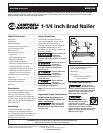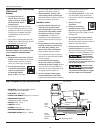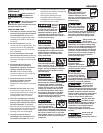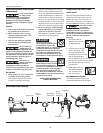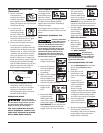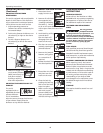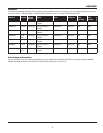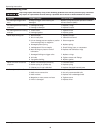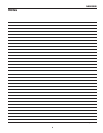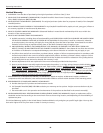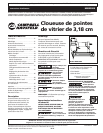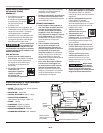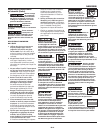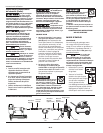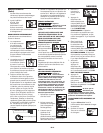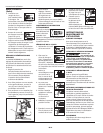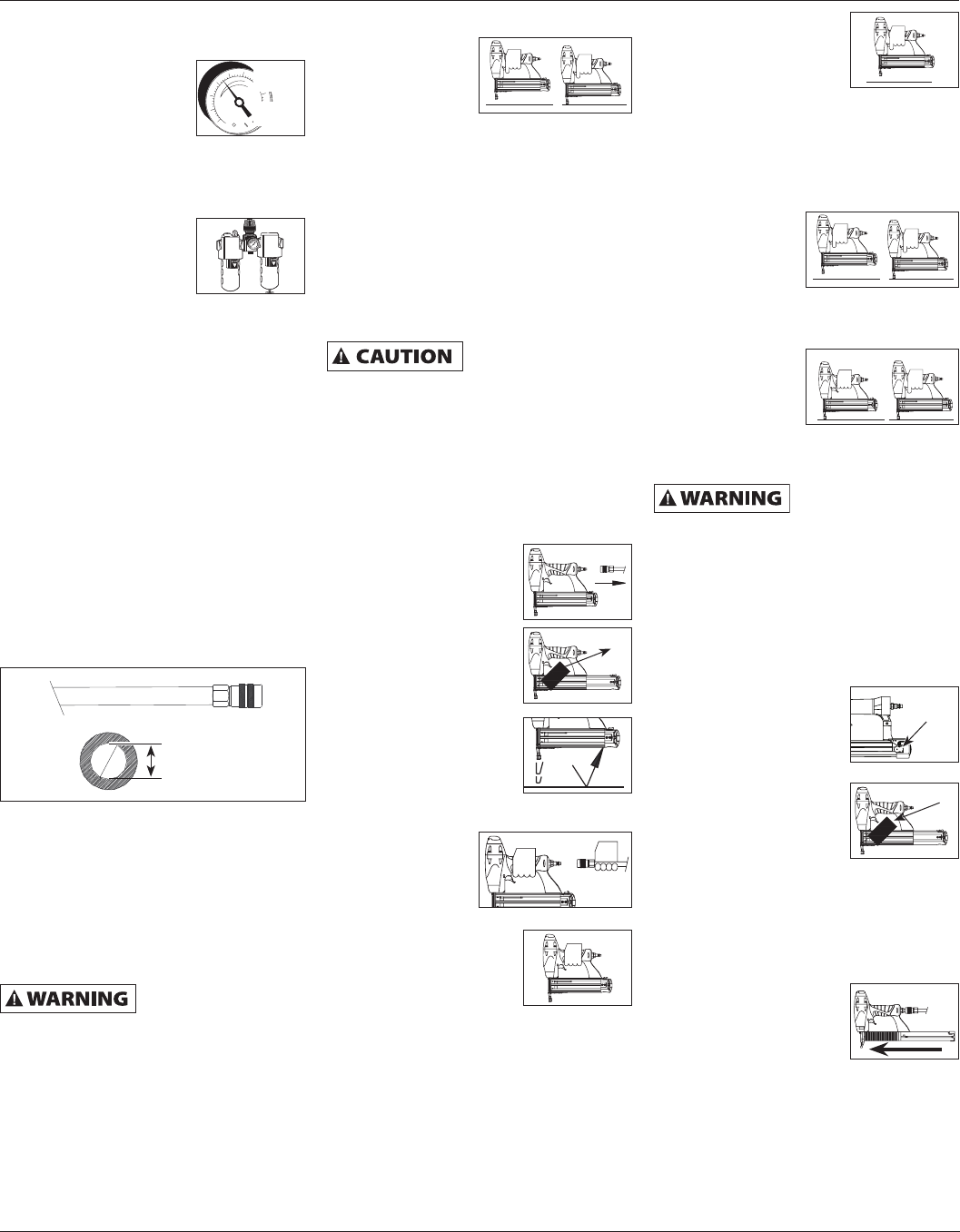
5
NB003008
www.chpower.com
OPERATING INSTRUCTIONS
(Continued)
1. The air compressor
must be able to
maintain a minimum
of 60 psi when the
tool is being used. An inadequate air
supply can cause a loss of power and
inconsistent driving.
2. An oiler can be
used to provide oil
circulation through
the tool. A filter can
be used to remove liquid and solid
impurities which can rust or “gum
up” internal parts of the tool.
3. Always use air supply hoses with
a minimum working pressure
rating equal to or greater than the
pressure from the power source if a
regulator fails, or 150 psi, whichever
is greater. Use 3/8 inch air hose for
runs up to 50 feet. Use 1/2 inch air
hoses for 50 feet run or longer. For
better performance, install a 3/8 inch
quick plug (1/4 inch NPT threads)
with an inside diameter of .315 inch
(8mm) on the tool and a 3/8 inch
quick coupler on the air hose.
4. Use a pressure regulator on the
compressor, with an operating
pressure of 0 - 125 psi. A pressure
regulator is required to control
the operating pressure of the tool
between 60 and 100 psi.
OPERATIONAL MODE
Always know the
operational mode of
the tool before using. Failure to know
the operational mode could result in
death or serious personal injury.
THIS TOOL IS SOLD WITH A BLACK
SINGLE SEQUENTIAL TRIGGER. THIS
TOOL IS NOT INTENDED TO BE USED
WITH A BUMP MODE TRIGGER.
SINGLE SEQUENTIAL MODE
This mode requires
the trigger to be
pulled each time a
fastener is driven.
The tool can be actuated by depressing
the Work Contact Element (WCE)
against the work surface followed by
pulling the trigger.
The trigger must be released to reset
the tool before another fastener can be
driven.
OPERATING A SEQUENTIAL TRIP
TOOL
Check the operation
of the Work Contact
Element (WCE) trip mechanism before
each use. The WCE must move freely
without binding through its entire
travel distance. The WCE spring must
return the WCE to its fully extended
position after being depressed. Do
not operate the tool if the WCE trip
mechanism is not operating properly.
Personal injury may occur.
1. Disconnect the air
supply from the tool.
2. Remove all fasteners
from the magazine
(see Loading/
Unloading).
3. Make sure the trigger
and work contact
element (WCE) move
freely up and down
without sticking or binding.
4. Reconnect air
supply to the
tool.
5. Depress the Work
Contact Element
(WCE) against the
work surface without
pulling the trigger. The tool MUST
NOT OPERATE. Do not use the tool
if it operates without pulling the
trigger. Personal injury may result.
6. Remove the tool from
the work surface.
The Work Contact
Element (WCE) must
return to its original
down position. The tool MUST NOT
OPERATE. Do not use the tool if it
operates while lifted from the work
surface. Personal injury may result.
7. Pull the trigger
and depress the
work contact
element (WCE)
against the work surface. The tool
MUST NOT OPERATE.
8. Depress the
Work Contact
Element (WCE)
against the
work surface. Pull the trigger. The
tool MUST OPERATE.
An improperly
functioning tool
must not be used. Do not actuate the
tool unless the tool is placed firmly
against the work piece.
LOADING/UNLOADING THE TOOL
1. Always disconnnect the tool from
the air supply before loading
fasteners.
2. Push down on the
latch button. Pull
back on the magazine
cover.
3. Insert a stick of
Campbell Hausfeld
nails or equivalent
(see “Fasteners”
section) into the
magazine. Make sure pointed ends
of nails are resting on bottom ledge
of magazine when loading. Make
sure nails are not dirty or damaged.
4. Push the magazine
cover forward until
latch button pops up.
5. Always unload all fasteners before
removing tool from service.
Unloading is the reverse of loading,
except always disconnect the air
supply before unloading.
Latch
Button
60 psi
Min.
100 psi
Max.
150 psi or greater
3/8 inch I.D.
Movement



